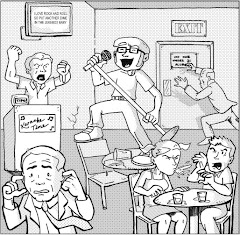Flaming Carrot Comics #31, October 1994, Dark Horse Comics
writer & artist: Bob Burden
letterer: Shannon T. Stewart
assistants: Gabrielle Greene, John Eaton, Chris Hunter
I don’t know how Bob Burden was inspired to create the Flaming Carrot, but I’m sure if he hadn’t, some ‘90s grunge band would have secured the name in no time. Smashing Pumpkins, Red Hot Chili Peppers . . . Flaming Carrots. Makes sense, doesn’t it?
As much sense as this issue. In the first of two Flaming Carrot stories, Herbie, a robust young man that derives super abilities from lollipops, recruits the Carrot in his time-traveling quest to determine if Shakespeare truly wrote his plays. The Flaming One and Herbie find “Billy Bob Shakespeare” only to learn that the Bard is a simple-minded hick, ably assisted by fellow time traveler Buddy Hackett, who simply seeks a legitimate forum for his less comedic artistic expressions. I loved this story for its sheer frivolity factor. If Burden had a point, it’s fairly far-fetched, best summed up by Hackett, “Ya know, nobody respects anything unless it was written long, long ago . . . if it ain’t old, it ain’t good! And I agree! I feel so creative, so full of inspiration in these old days!” Oh-kay. So where in the plotting process did Burden conclude, “I can analyze the irony of classic versus contemporary literature with a team-up between Buddy Hackett and Shakespeare?” You won’t see this stuff in the X-Men.
Reading Burden’s supplemental essay, I realize that his story was potentially an expression of his frustration with the comics medium, more specifically, his inability to produce new material as quickly as he was writing it. Prior to its success on the silver screen, Burden apparently had three or four Mystery Men comics scripts collecting dust on his desk, with no available artists to help him complete the creative and publication process. His compromise was surprisingly ingenious by early ‘90s standards: Burden sought to publish the scripts as text-intensive comics, with a colorfully illustrated cover and a few interior pieces here and there for the feint of heart, dubbed Version-A Comics. Although scripts have since been included in trade paperbacks and graphic novels as “Easter eggs” for the faithful collector, the creative process for comic books was still a mystery to many of its fans at this time. A few books from Eisner and the classic How to Draw Comics the Marvel Way were the only reliable texts with true behind-the-scenes insight. No Warren Ellis e-newsletters. No Wizard magazine or Scriptwriters on Scriptwriting. Yet. Burden’s Version-A Comics may have been alternative form of comics reading, but ultimately, they were the foundation for the educational angle scribes like McCloud have capitalized on since then.
I wonder what came of the idea. When Mystery Men took off as a franchise, did Burden toss Version-A to the wayside? Would the market embrace a project like that from another established creator? Interestingly, Burden comments that, “I have a small but loyal audience, and a need to keep my work in front of them with a monthly book.” This commitment and humility was shocking to read from a comic book creator, who, from my limited experience, usually act like God’s gift to graphic literature, like a month or two off here or there is worth the reader’s wait when it comes to their work. Further, I never would have thought that a writer would reveal the size of his audience. That’s proverbial locker room squabble I thought comic professionals reserved for after their signings at comic book conventions. More so than his actual comic, Burden’s insight into his process and the industry in general is enough to make me want more. The carrot may be flaming, but here is an artist truly on fire.
I don’t need a time traveling grandfather clock to prove that Burden is the genius behind this literature. If only he had one to see where his work would end up.
Thursday, August 24, 2006
Subscribe to:
Post Comments (Atom)



No comments:
Post a Comment